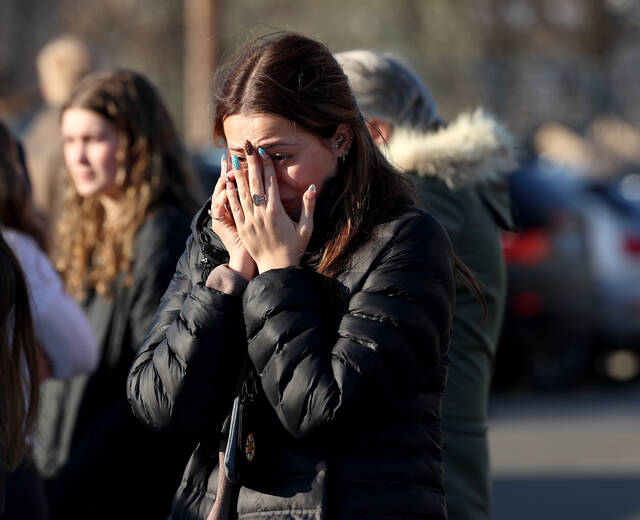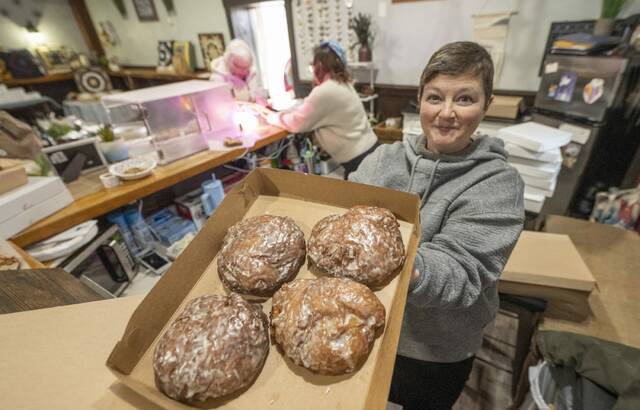Despite recent cases in which vaccinated people got infected and died from coronavirus, getting inoculated is still the best protection against the virus, according to medical experts.
While the Allegheny County Health Department’s online covid dashboard does not distinguish between vaccinated and unvaccinated people in its death data, it does collect such information.
On Dec. 23 — when the first lab-confirmed cases of the omicron variant were reported by Allegheny County — the health department noted in its weekly report that there were 101 covid-related deaths during December in the county.
Among the people who died, 73 were unvaccinated and 28 had received the vaccine, health officials said. Eighteen of the 73 people unvaccinated were between the ages of 30 and 59 age group.
Of the 28 deaths among vaccinated people, 25 were over 70 years old, while the other three were over 60.
A health department spokesman said the county is working on including information about whether or not people who die from coronavirus have been vaccinated. That information is expected to be included on the covid dashboard after the first of the year.
Actual cases likely higher
Allegheny County Health Department Director Dr. Debra Bogen said the number of infections is likely larger than the county’s data indicates.
“We continue to see increasing numbers of new infections reported to the health department, including reinfections and breakthrough cases,” Bogen said. “We know this number is an under reporting because many people are using home tests.
“We know that the omicron variant spreads efficiently and is the likely cause of the rapidly rising case numbers,” she said. “I anticipate that the number of cases will continue to rise in the coming weeks.”
As of Tuesday, nearly 918,000 county residents have received at least one vaccine shot and almost 300,000 of them have received a booster.
According to a vaccination data report issued on Dec. 13 by the state Health Department, the number of cases involving vaccinated people statewide is increasing.
In all, since Jan. 1, cases involving fully vaccinated people account for 15% of all positive cases. However, vaccines did not become readily available to the general public until months into 2021.
Since October, cases involving vaccinated people have risen — accounting for 26% of all cases in September followed by 30% of cases in October and 31% in November, according to the latest data available.
Hospitalizations involving fully vaccinated people have increased, but rather modestly over the previous three months.
The increase accounts for about 25% of all covid-related hospitalizations statewide, according to state data.
Covid expert not surprised
Dr. Amesh Adalja said he is not surprised that a significant number of vaccinated people have died from coronavirus because some people remain at high risk due to underlying health issues.
“It’s not a false sense of security that the vaccine protects people who are healthy and have no underlying medical problems,” he said. “The people who are dying are in the high-risk population.”
Adalja said the danger for people with a history of cancer, organ transplants or other medical issues is the same for coronavirus as it is for any other condition that affects the respiratory system, such as the flu.
“Covid preys on individuals who have other medical problems, and it will continue to prey on them,” he said. “But for the people who are fully vaccinated and have no underlying issues, this is going to be an innocuous illness for them.”
Adalja said even fully vaccinated, healthy people should be cautious about exposure to coronavirus because, while they likely won’t get sick, they could spread the virus to people who are at greater risk of becoming ill.
At Excela, many not fully vaccinated
Dr. Carol Fox, chief medical officer for Excela Health, which is the predominant medical provider in Westmoreland County, said vaccinated people may be testing positive for covid because “immunity wanes after a period of time after infection, as well as after the initial series of vaccinations.”
She noted that the omicron variant, which is now said to be the predominant strain in the U.S., is highly infectious and “likely to be the culprit” for the recent increase in infection rates.
Fox said as of Dec. 22, Excela was treating 91 patients who had tested positive for coronavirus. Of that number, 88% were either unvaccinated or only partially vaccinated. Of the patients who required a ventilator to assist with breathing, all were either unvaccinated or partially vaccinated.
“Vaccines do not prevent 100% of infections,” Fox said. “They do, however, do well at limiting the degree of illness that is produced when one becomes infected. That is why boosters are so important.”
Excela does not ask all patients it treats whether they have been vaccinated, Fox said.
She noted that among the people tested at the health system’s three hospitals during December, 86% were not fully vaccinated.
Allegheny County and Pennsylvania as a whole reported record-breaking covid-19 case counts on Friday, posting numbers above even the height of the late 2020 surge, data shows.
Expert: Surge should sound the alarm
Bogen said the surge in infections should sound the alarm for people to protect themselves.
“I ask everyone to take this seriously and do their part to slow the spread of this virus,” she said. “Most importantly, please get your vaccines or your booster vaccine. Second, wear a properly fitting mask when out in public, especially indoors.”
Bogen said people should consider double masking by wearing a surgical mask covered by a cloth masks, two surgical masks or a KN95 mask.
She said businesses can do their part to slow the spread of the virus by requiring employees and patrons wear masks.
Bogen also urged people to practice physical distancing, stay home if they are sick and avoid large gatherings to reduce transmission of the virus.
“Get tested if you are experiencing covid-19 symptoms,” she said. “If you have been in close contact of someone who has tested positive for covid, get tested five to seven days after that exposure.”








